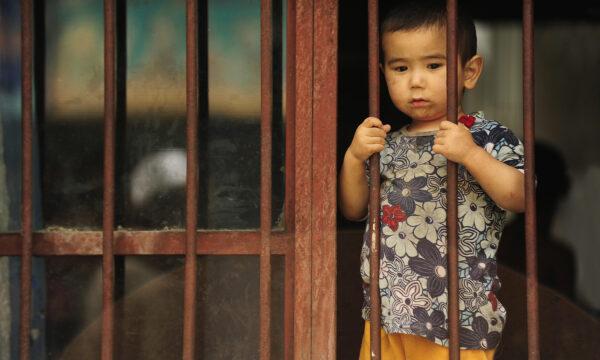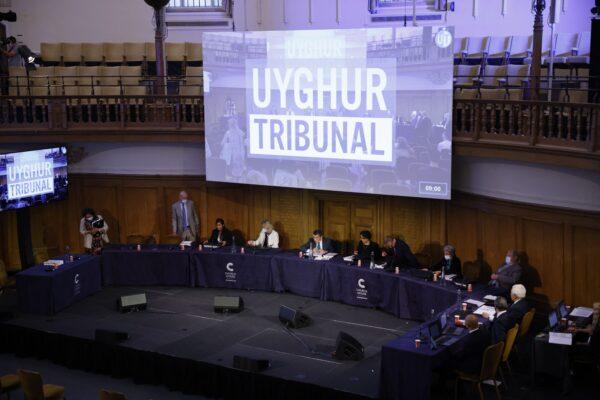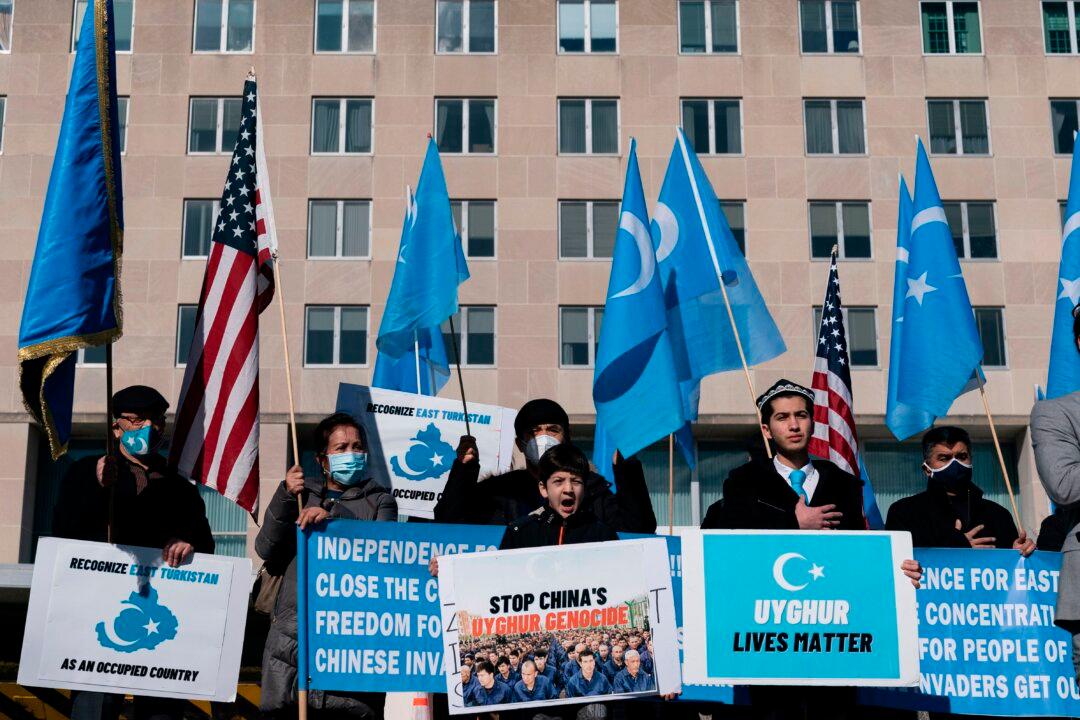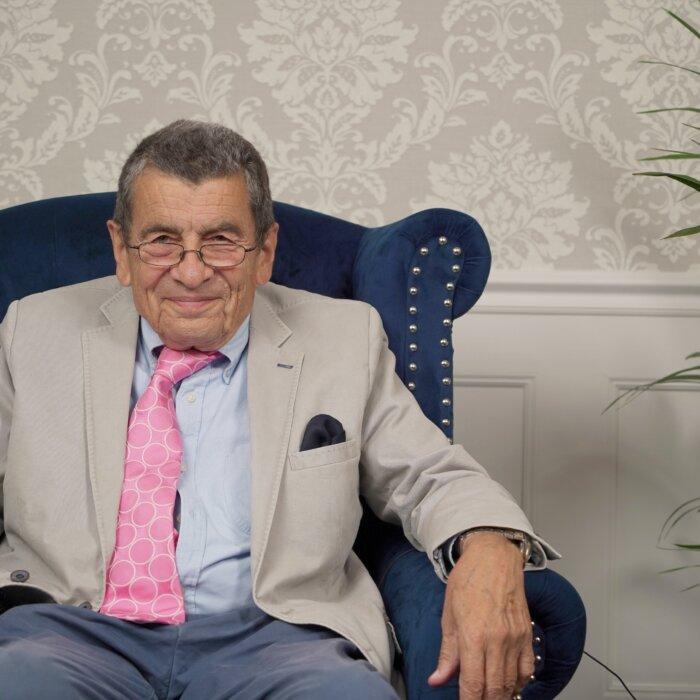China’s communist regime is effectively using a “misinformation campaign” to put a patina of palatability on its genocide, according to Omer Kanat, the executive director of the Uyghur Human Rights Project.
The misinformation includes scripted foreign dignitary visits to what the regime calls the “Xinjiang Uyghur Autonomous Region” and a trickle of visits abroad by muzzled Uyghurs who are instructed only to say good things about Xinjiang.
Meanwhile, the regime is relocating hundreds of thousands of Uyghurs from reeducation camps, where they are put through a brainwashing program, to state prisons and forced labor factories where they can work over 10 hours per day in addition to political indoctrination sessions.
Detained Uyghurs are typically not given trials but sentenced en masse in overcrowded cells. The up to 15-year arbitrary sentences are based on Uyghurs’ innocent foreign visits, religious observance, or, lacking that, trumped-up charges and false testimony.
‘Slowly, the Uyghurs Will Disappear’
Mr. Kanat said that over 800,000 Uyghur children are separated from their parents in boarding schools and state-run kindergartens. They are given new non-Uyghur names and punished for using their real names. The children are banned from speaking Uyghur or practicing religion. “Very few” Uyghur children are left with their parents, he said.As early as 2010, there were complaints about boarding schools not allowing children to speak Uyghur to their parents during weekly calls. When the parents are taken to concentration camps, the children are forcefully removed from the care of even their extended families, including grandparents, aunts, and uncles, he said.
Mr. Kanat said the Chinese regime sees Uyghurs as disloyal foreigners who, if a war occurs, could be armed by the United States and fight against Beijing. “They actually want to get rid of the Uyghurs,” he said.
“They cannot kill all the Uyghurs now. It is the 21st century. Maybe they are not able to kill them, but they want to get rid of the Uyghur identity and culture and turn them into something else.”
The first act forced on Uyghurs in reeducation camps was to affirm that “I don’t believe in God. I believe in the Communist Party,” he said. After assimilation, the Uyghurs are meant to look Uyghur but think, live, and act in a Chinese way. They “may turn into Chinese,” he said. “Slowly, the Uyghurs will disappear if this policy continues.”

Mr. Kanat said that while the Chinese Communist Party’s (CCP) tactics have changed, the intent to “eliminate the Uyghur identity” is the same. “Time is on China’s side” in the normalization of genocide, he said. They are succeeding because there is no strong and coordinated action by the international community.
The Uyghur birth rate dropped 50 percent between 2017 and 2019, Mr. Kanat said, including through forced sterilization. “Most of the men” who are fertile are in prison, he said. Hundreds of thousands of Uyghur women are in prison. Every Uyghur woman between the ages of 18 and 55 is required to accept a doctor-inserted birth control method called an intrauterine device (IUD), he said.
Han Chinese men of the dominant ethnicity in China travel to East Turkistan and impose themselves in forced marriages on Uyghur women after seeing government ads about “beautiful Uyghur girls,” Mr. Kanat said. Uyghur women feel forced into marriage with them because if they say no, the men can claim racial discrimination against Han. “She will be punished, or her family will be punished” by the regime, he said.
The regime also inserts Han men into Uyghur families through a widely-reported program called “becoming family,” including sleeping arrangements on the same living-room-sized platform bed traditionally used by entire Uyghur families. The Han minders observe, record, and report on their “family members,” leading to the imprisonment of household members who observe religious practices, for example.
Genocide
The CCP might want to kill all the Uyghurs but cannot do so, given the likely global pushback, Mr Kanat said. However, the repression of Uyghurs does fit the United Nation’s definition of genocide.Mr. Kanat’s office in Washington was small and spartan: a desk, a few bookshelves full of books, and a bare coat rack. This graying and serious man has the weight of the world on his shoulders and is laser-focused on the genocide and those complicit in its crimes.
Mr. Kanat was grateful to the United States for being the only country to officially recognize the genocide and for passing two laws supporting Uyghurs, including the ban on goods made with forced labor from Uyghur areas. He said that several more bills are in the pipeline.
In addition, the prime minister of Turkey has called the repression a “genocide,” denounced it at the United Nations, and accepted hundreds of thousands of refugees, according to Mr. Kanat.
Of the G7 countries, only Germany and Italy have not passed a motion in favor of the Uyghurs. No Muslim countries have passed laws supporting the Uyghurs. Saudi Arabia went so far as to support China in a statement.
Mr. Kanat argued that the CCP took inspiration from the lack of international response against the Rohingya genocide in Burma (also known as Myanmar). However, Beijing made a major mistake in applying such measures to Uyghurs, even given the goal of assimilation. Uyghurs were already assimilating themselves, including through Chinese language education of Uyghur children, Mr. Kanat argued, which was required to get good jobs. The heavy repression, however, woke up the Uyghurs and the world to the China threat.

‘Hope for Us’
Mr. Kanat said it is “a hope for us” that all the Uyghurs now know they are under threat. There is no Uyghur now on the side of communist China, he said. None of them want to live under that system. Even a prominent Uyghur governor and advocate of bilingual education is now sentenced to life in prison, according to Mr. Kanat. Even atheist and communist Uyghurs who have a Chinese mindset are not trusted by the regime, he said. So, there is no Uyghur left on the side of Beijing. There is no way that Uyghurs can live with or trust the regime.As far back as 2010, the Shanghai Cooperation Organization (SCO) countries apparently had a policy against accepting Uyghurs, including for travel.
“I was deported from the Kazakh border in 2010 because they said you are not allowed to visit any member countries of the SCO because [of] the Chinese government’s pressure,” Mr. Kanat said.
Mr. Kanat was critical of the failure of the international community to stop the genocide. He is disappointed when U.S. government officials travel to China and sit “at the same table” with CCP leaders who are committing genocide. He observed that attempts to “normalize” relations between the United States and China instead normalize genocide.
There are tools that the U.S. government could better deploy against the genocide, he said. The number of sanctioned individuals and companies for forced labor is just about a dozen, he said, where many more CCP leaders, including at the county, provincial, and central levels, are liable.
“We can provide hundreds of names,” he said. “There are hundreds of camps,” at each of which is an identifiable regime official responsible.
Missing in action among the G7 countries that adopted the Uyghur cause are Germany and Italy, whose parliaments have not yet passed resolutions denouncing these “crimes against humanity,” much less “genocide.” Mr. Kanat explained that they have too much business in China and so cannot (or more likely will not) take a stand.
Ironically, according to Mr. Kanat, CCP leader Xi Jinping’s heavy-handed approach to eradicating Uyghur culture had the opposite effect. Uyghurs were already losing their culture, slowly but surely, because getting a good job in China required speaking Han and being a CCP member. Mr. Xi’s visit to Xinjiang, however, made him overreact. He demanded an acceleration of the assimilation that was already happening. That woke up Uyghurs and the world, which started resisting, Mr. Kanat noted.
Despite dark times for Uyghurs, Mr. Kanat said he was still hopeful because the Uyghur people are speaking up, resisting, and cooperating to ensure their survival and a better future.
“Still, we are there,” he said. “The Chinese government has still not been able to assimilate us.”







